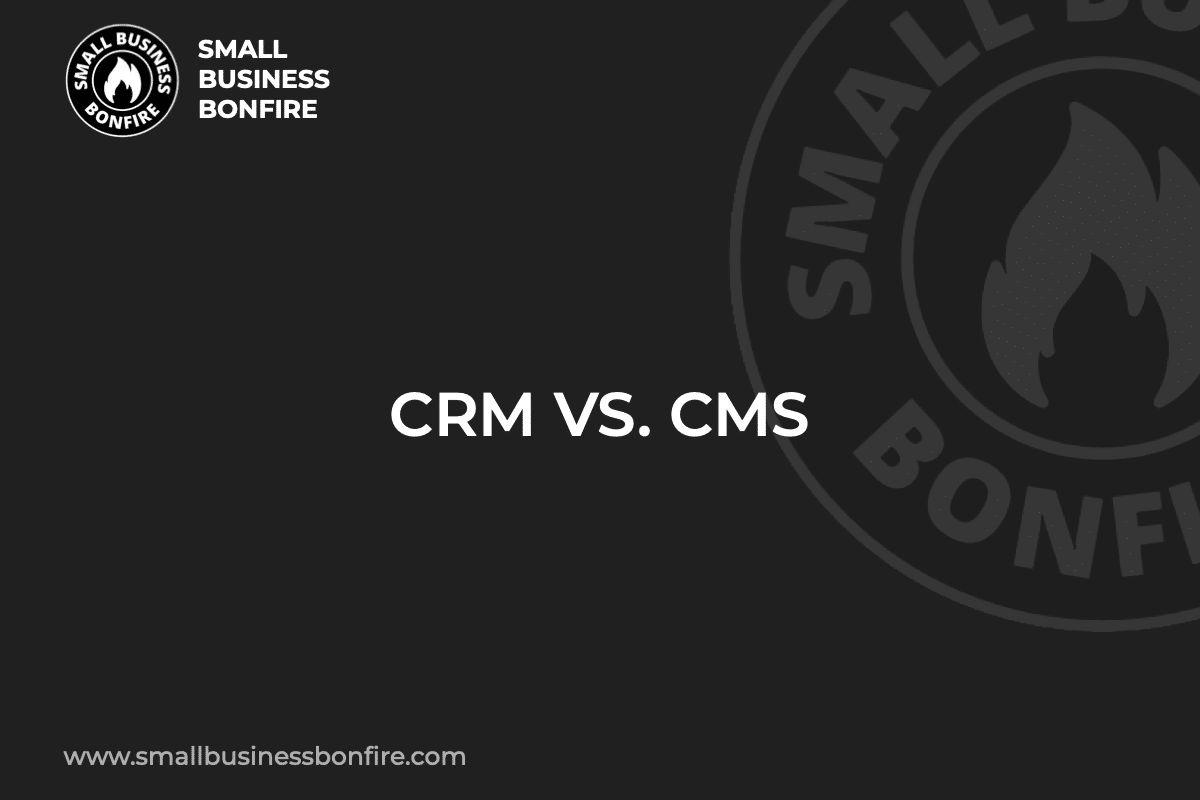Ever found yourself tangled in a maze of customer information, struggling to maintain relationships while also managing your website content?
You’re not alone. Many small businesses are finding themselves straddling the line between a customer relationship management (CRM) system and a content management system (CMS).
Hi! AJ here. Over the last decade, I have grown and (recently) sold my business.
After a successful exit, I began Small Business Bonfire (SBB) to aid entrepreneurs and small business owners in creating and expanding their companies with the help of modern technology.
I understand it may seem puzzling – CRM vs. CMS. Which one does your business need more? But here’s the kicker – you don’t have to choose.
Let’s dive in, and I will tell you why!
Key Takeaways
- An eCommerce business website can use both CRM and CMS
- CRM software can help businesses keep track of their sales funnel
- Using CMS reduces the need for businesses to hire digital marketing specialists
- Both software solutions can help eCommerce websites improve their online presence
Related Reading: Best Small Business CRM
SBB Featured Partners
What Is a CRM (Customer Relationship Management)?
What is a CRM? If you don’t already know, a CRM (short for customer relationship management) is a software tool businesses can use to manage customer interactions with potential and existing customers.
It helps to streamline all customer-related information in one central location for easy access and organization.
This allows business owners to provide more personalized and efficient service because they can tailor their communication and marketing efforts to each individual customer.
CRM Benefits
One of the key benefits of CRM systems is the ability to quickly review customer purchases, communications, and notes in one place.
This makes it easier for your team to track client interactions and quickly respond to any issues or requests that they may have.
With this software, small businesses can also gain valuable insights into consumer behavior and preferences through data analysis and reporting tools, which can help them make more informed decisions about their business processes.
Features of CRM
I have tested and used many different types of software at the agency and found some of the most beneficial CRM features to help us better manage customers.
These features include the following:
- Contact management tools
- Automated customer data capturing
- Lead tracking
- Content repository
- Analytics & reporting
Let’s dig deeper into these powerful features!
Contact Management Tools
One of the main features of CRM software is its contact management system.
These tools allow business owners to track customers’ contact information and see a complete history of their communication with the business, including emails, phone calls, live chat, and in-person interactions.
This helps sales representatives and customer service agents quickly understand customers’ needs and provide them with more effective solutions.
Additionally, most CRMs allow sales and marketing teams to automate certain communication, such as email follow-ups or appointment reminders, freeing up time to focus on other aspects of the business.
Automated Customer Data Capturing
CRM systems can also help businesses automatically capture customer data, such as purchase history, which can be used for segmenting customers into targeted groups for custom marketing campaigns.
This means businesses can collect and store customer information through various channels, including social media, email marketing, and website interactions.
Not only does this save time and make life easier, but it also allows business owners to better understand and serve their customers.
Lead Tracking
Lead management is another powerful feature of CRM software solutions.
This helps businesses to easily identify leads, track their progress in the sales process, and convert them into paying customers with minimal effort using automated processes and timely follow-ups.
You can also use CRM to assign leads to the right salesperson or team member based on factors like their location or level of interest.
Plus, lead management tools allow sales teams to be more efficient in nurturing prospects through the sales funnel and identify areas for improvement easily.
Content Repository
Most CRMs also have a built-in content repository, which allows sales teams to store and organize all their documents, proposals, invoices, and other materials in one place.
This makes it easier for sales representatives to access the resources they need when engaging with customers quickly.
Plus, having a central repository for all important documents can help keep teams organized and ensure nothing is lost or misplaced.
This helps business owners be more efficient in their customer service activities, as they don’t have to waste time searching for the right document or material.
Analytics & Reporting
Finally, many CRMs provide analytics and reporting capabilities that allow users to measure key performance indicators (KPIs) and gain valuable insights into customer behavior.
This helps teams to see which campaigns and strategies are working and pinpoint issues that need to be addressed.
These analytics also make it easier for business owners to optimize their sales processes and activities based on real-time data, enabling them to make better decisions faster.
With the right CRM software, you can easily analyze data, generate reports, and get the guidance you need to boost your bottom line.
How Does a CRM Work?
To reiterate, CRM solutions are designed to make it easier for businesses to manage customer relationships, automate processes, and optimize marketing and sales.
This helps businesses build stronger customer relationships, leading to long-term loyalty and higher customer satisfaction rates.
It also allows teams to engage with customers more efficiently and ensure they receive the best possible service.
Does Your SMB Need a CRM?
As a small business owner, it can be tempting to think that a CRM system is only necessary for larger companies.
However, having a CRM can greatly benefit your small business by helping you keep track of customer interactions, identify sales opportunities, and improve customer retention and satisfaction.
By integrating a CRM into your small business, you can easily capture customer data, track leads, store documents, and gain valuable insights into your marketing campaigns, which can enhance the overall customer experience.
CRM Examples
If you are looking for CRM solutions to help manage your customer relationships, there are many options available.
Below are two of my top choices for the best CRMs!
HubSpot CRM
HubSpot CRM is an incredible tool that can help small businesses streamline their sales and marketing processes.
With a simple and intuitive interface, it makes it easy for teams to manage their contacts, track sales activities, and automate repetitive tasks.
It also offers a variety of integrations with popular tools like Gmail, Salesforce, and Slack, making it easy to stay connected with your team.
To learn more about this platform, read our comprehensive HubSpot CRM review!
Monday Sales CRM
Monday Sales CRM is also a powerful tool specifically designed for small businesses.
With this intuitive, user-friendly platform, you can easily manage your sales pipeline, track consumer interactions, and streamline your workflow from one convenient dashboard.
Plus, it offers a range of affordable pricing plans to suit businesses of all sizes, so you don’t have to break the bank to get the tools you need to succeed.
If you want to learn more about this service, here is our detailed Monday CRM review!
CRM Examples
If you are looking for CRM solutions to help manage your customer relationships, there are many options available.
Below are two of my top choices for the best CRMs!
HubSpot CRM
HubSpot CRM is an incredible tool that can help small businesses streamline their sales and marketing processes.
With a simple and intuitive interface, it makes it easy for teams to manage their contacts, track sales activities, and automate repetitive tasks.
It also offers a variety of integrations with popular tools like Gmail, Salesforce, and Slack, making it easy to stay connected with your team.
To learn more about this platform, read our comprehensive HubSpot CRM review!
Monday Sales CRM
Monday Sales CRM is also a powerful tool specifically designed for small businesses.
With this intuitive, user-friendly platform, you can easily manage your sales pipeline, track consumer interactions, and streamline your workflow from one convenient dashboard.
Plus, it offers a range of affordable pricing plans to suit businesses of all sizes, so you don’t have to break the bank to get the tools you need to succeed.
If you want to learn more about this service, here is our detailed Monday CRM review!
What Is a CMS (Content Management System)?
CMS stands for content management system, and it’s software that helps you manage and publish digital content, like website pages, blog posts, images, and videos.
It’s a great tool for small businesses because it allows them to easily create, edit, and publish all their content.
This makes it simpler for them to keep their website up-to-date and manage multiple content projects from a single platform.
CMS Benefits
One of the biggest benefits of using a CMS is that it simplifies the process of updating your website.
So you don’t need to be a tech expert or understand complex code to upload new content, make changes, or add new pages.
These platforms also offer a wide range of features like templates, drag-and-drop editors, and plugins that can help you customize your website.
This means you can easily create a professional-looking website that reflects your brand without hiring a designer.
Features of CMS
While at the agency, I utilized several CMS software and discovered the best features that helped better manage the content creation process.
Some of these features are as follows:
- Content management tools
- Content publishing tools
- Themes & templates
- Website data & analytics
- SEO tools
- Blogging tools
- Integrations & extensions
Let’s review each feature in more detail!
Content Management Tools
One of the most significant features of CMS software is its content management tools.
These tools enable small businesses to create and edit digital content with little coding knowledge.
It allows them to easily upload and manage their content, create new pages and posts, and customize their website’s design.
Content Publishing Tools
CMS platforms also come with content publishing tools to help you publish your new content quickly and easily.
These tools allow you to schedule posts, set up automated notifications, and preview changes before they go live.
It also enables users to organize their content according to their needs, so they can easily find and access their files.
Themes & Templates
Another great feature of CMS software is the ability to choose from a range of customizable themes that allow businesses to design stunning web pages without requiring extensive knowledge of web development.
This allows business owners to create a cohesive look and feel while still maintaining individuality within pages.
Furthermore, templates can be tweaked to include the right combination of text, images, and videos required to enhance the customer experience, which means companies can make a professional website with a personalized touch that reflects their brand’s identity.
Website Data & Analytics
Additionally, CMS platforms offer website data and analytics features that allow small businesses to analyze their website’s performance.
This includes tracking page views, user preferences, and engagement metrics.
It can also monitor customer behavior across the website to determine what content resonates with visitors.
This data is extremely valuable for businesses as it helps them better understand their target audience and maintain an effective online presence.
SEO Tools
Most CMS platforms also include SEO (search engine optimization) tools to help small businesses track their website’s performance with search engines.
It enables users to add meta tags, optimize content for keywords, and customize page titles and descriptions.
This ensures that your business appears at the top of search engine rankings, drives more organic traffic to your website, and increases visibility online.
Blogging Tools
Blogging is a great way for small businesses to increase their online presence and engage with their audience.
It can also help maintain a more active online presence and improve your website’s search engine rankings by regularly providing fresh and relevant content.
Plus, with a CMS, you can easily manage your blog posts and make updates or edits whenever needed.
This is great for business owners who want to keep their websites up-to-date and attract more visitors.
Integrations & Extensions
Lastly, CMS software provides integrations and extensions that allow organizations to add extra features to their website.
This means business owners can add custom functionality, such as payment gateways, social media widgets, or customer support tools, to their websites with just a few clicks.
For example, they can easily add a contact form, a social media share button, or an eCommerce online store to their website.
This helps provide a seamless experience for customers while also improving the efficiency of business operations.
How Does a CMS Work?
At its most basic level, a CMS platform allows users to create and edit content on their website.
It enables them to upload images, videos, PDFs, and other files from their computer or the web.
Once the content is created, it can be published to the website for the world to see and makes sure the content is properly formatted and optimized for search engine rankings.
Does Your SMB Need a CMS?
CMS systems are great for small business owners because they simplify creating, editing, and managing content.
Instead of manually coding website pages and posts, you can use a CMS to do it all in one place.
Additionally, a CMS often has features for collaboration, version control, and approval workflows, making it an ideal platform for teams to work together.
With a reliable CMS, you can streamline your content creation and management processes, ultimately saving you time and resources while boosting your online presence!
CMS Examples
Small businesses use several popular CMS platforms on the market.
Each platform offers its own unique features and benefits, enabling you to choose the right one for your business needs.
Listed below are some of my favorite CMS services I tested and used at the agency!
WordPress
When it comes to content management systems, WordPress is one of the most popular options out there.
It’s a user-friendly platform that allows you to easily create and manage your website’s content without knowing how to code.
With thousands of customizable themes and plugins available, it’s versatile enough for anything from a simple blog to a full-fledged eCommerce site.
Plus, it’s constantly updated and improved by a dedicated community of developers.
Shopify
Shopify is a popular example of a CMS perfect for small businesses setting up an online store.
It offers a user-friendly interface that’s available to anyone, regardless of their technical skill level.
The platform also allows you to easily add, manage, organize your products, and monitor your sales and customer orders.
Moreover, its built-in SEO features help optimize your website for search engines, while its mobile responsiveness means customers can shop on the go.
Do You Need Both a CRM and a CMS?
As a small business owner, you may be wondering if you should invest in both a CRM and a CMS.
The answer is it depends on your business needs. Both are essential tools for helping your business succeed, offering different features and capabilities.
If your business requires a lot of customer interactions, such as a sales-focused business, then a CRM would be a worthwhile investment.
On the other hand, if your business is heavily focused on creating and distributing digital content, such as a blog or online publication, then a CMS would be more beneficial.
However, suppose your business requires both customer management and digital content creation.
In that case, investing in both systems can help you streamline sales processes and effectively manage all aspects of your business.
Ultimately, it’s important to evaluate your business needs and resources before deciding which systems to invest in.
Just as there are distinct variations between CRM and CMS, there also exist numerous other types of software that diverge from CRM that you might be interested in.
CRM vs. CMS: What's the Difference?
When it comes to managing your online presence, understanding the difference between CRM vs. CMS is crucial.
While both systems are essential in their own ways, they serve different purposes.
How are a CRM and a CMS Different?
As previously discussed, the main difference between these systems is that a CRM focuses on managing customer relationships and interactions.
In contrast, a CMS focuses on creating and managing digital content to upload on business websites.
How are a CMS and a CRM Similar?
However, CRM and CMS also share various similarities that can’t be denied.
For instance, both systems are designed to make business processes smoother by keeping important data organized and easily accessible.
They also allow you to monitor customer behavior, communication, and interactions with your business and help you create targeted campaigns that convert leads into customers.
Plus, they both offer scalability and can be customized to meet the specific needs of your small business.
How to Integrate Your CMS and CRM
CRM and CMS integration is essential for small businesses to maximize their lead generation and customer retention efforts.
While they can both be valuable tools for your business, they should be used in conjunction with each other to get the most out of your online presence.
How to Integrate WordPress With Your CRM
If you’re looking to integrate your WordPress website with a CRM system, there are a few options available to you.
One popular method is using plugins like WPForms, Gravity Forms, or Ninja Forms.
These plugins allow you to create forms for your WordPress website that can capture leads and other important data, then send that information over to your CRM, where you can manage and nurture those leads.
Additionally, some CRM providers even have their own WordPress plugins that make integration even easier.
How to Integrate Shopify With Your CRM
Integrating Shopify with a CRM is easy.
It has an extensive list of CRM integrations available in its app marketplace.
All you have to do is select the CRM integration that’s right for your business, then follow the instructions in the app to connect it with your Shopify store.
Once connected, you’ll be able to keep better track of your sales and customer relationships, all from within your CRM.
These integrations can automate data transfer and personalized emails between Shopify and your CRM, saving you time and effort.
Similar Articles You Might Be Interested In
Now You Decide
Using both CRM and CMS can provide invaluable benefits to your small business.
However, it is essential to first understand their differences before deciding which system is right for you.
While they serve different purposes, they can streamline your operations, improve customer relations and ultimately boost your bottom line when integrated effectively.
By having a system in place that tracks your customer interactions and also manages digital content, you can create a more personalized customer experience that sets you apart from your competitors.
Are you a business owner? Do you want to improve customer satisfaction and content quality? Let’s continue the discussion in the comments below!
FAQs CRM vs. CMS
Salesforce is a CRM platform rather than a CMS. Although it does have CMS capabilities, its primary focus is on managing customer interactions and relationships.
Shopify is an eCommerce platform that is both a CRM and a CMS. As a CRM, it helps you manage customer relationships by keeping track of interactions, purchase history, and preferences. However, as a CMS, Shopify provides an easy-to-use platform for building and managing your online store.
The three main types of CMS include open-source CMS, proprietary CMS, and cloud-based CMS.
WordPress is one of the most popular CMS platforms used by millions of websites worldwide. It’s an open-source platform that allows users to create and publish content easily without knowing how to code.
Newsletter Signup
Join The Leads Field Guide Newsletter for tips, strategies and (free) resources for growing your leads, and closing more deals.




